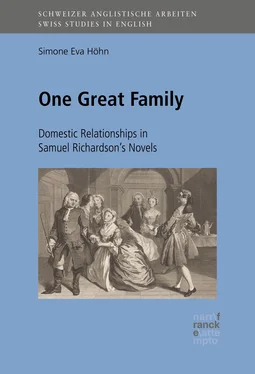If Belford tries to establish an incommensurable gap between Clarissa’s body and mind,6 Lovelace tries to bridge it – although the only way to achieve this seems to be to lower the ‘angel’ into a ‘mere’ woman. The two rakes, different as they are in their intentions as to Clarissa, seem yet very much in agreement as to the relationship between body and mind. Both, for example, “construe pregnancy as an acknowledgment of the body, even as an acknowledgment of desire” (GwilliamGwilliam, Tassie 83). One fears this acknowledgment as degrading, the other welcomes it as providing his chance for dominion – although that dominion will also destroy some of Clarissa’s worth as a conquest. Lovelace’s expectation that physical possession will equal possession of the mind connects him to the rakes of amatory fiction of the early eighteenth century. In Delarivier ManleyManley, Delarivier’s New Atalantis , for example, Charlot, initially virtuous, gives in to her love for her guardian after he rapes her:
Her first emotions [when she sees him] were all joy but in a minute she recollected her self, thinking he was not come there for nothing. […] Whilst yet her surprise made her doubtful of his designs, he took advantage of her confusion to accomplish ’em. Neither her prayers, tears, nor strugglings could prevent him, but in her arms he made himself a full amends for all those pains he had suffered for her.
[…] ’Twas very long before he could appease her, but so artful, so amorous, so submissive was his address, so violent his assurances – he told her, that he must have died without the happiness – Charlot espoused his crime by sealing his forgiveness. He passed the whole night in her arms – pleased, transported, and out of himself – whilst the ravished maid was not at all behindhand in ecstasies and guilty transports. (39–40)
ManleyManley, Delarivier plays on the several meanings of “ravish”; Charlot has been raped, but the conquest of her body has also captivated her mind. Similarly, in Eliza HaywoodHaywood, Eliza’s The Masqueraders , part I, Philecta barely manages to resist her love for the rake Dorimenus – but once he subdues her body, in a passage that obscures the boundaries between aggressive seduction and rape, she succumbs to him entirely (41–3). In the second part, it is Dorimenus’s wife who, after attending a masquerade, succumbs to something in-between seduction and rape (ironically, it is her own husband who “ravishes” her; because they are both masked, neither recognises the other). In Haywood’s delicate phrasing, Dorimenus “satiated his utmost Wish,---but it was in such a manner, that the fair Nun [his wife’s masquerade habit] could neither accuse herself of a too easy granting, nor him of an absolute Force in taking” (17). Although she initially resists the advances of her masked admirer, she is ready to meet him again once he has gained possession of her body. “ [O]nce subdued, always subdued ” (675), as Lovelace says: this is the pattern of amorous fiction he intends to repeat (cf. also DoodyDoody, Margaret Anne, A Natural Passion 137–50).7
His first attempt at rape is quite close to this script. In the fire scene, Clarissa is confused and frightened; she is also half undressed (in New Atalantis , as in Fanny Cleland, John Hill , prolonged seduction or rape scenes tend to take place after at least one of the characters has just bathed and is not fully dressed). Nevertheless, she keeps enough self-control to persuade Lovelace to leave her; as soon as he is out of the room, she locks and bars the door. It is shortly before this aborted attempt at ‘seduction’ that Lovelace fantasizes about Clarissa nursing his twin children:
Let me perish, Belford, if I would not forgo the brightest diadem in the world for the pleasure of seeing a twin Lovelace at each charming breast, drawing from it his first sustenance; the pious task continued for one month, and no more!
I now, methinks, behold this most charming of women in this sweet office, pressing with her fine fingers the generous flood into the purple mouths of each eager hunter by turns: her conscious eye now dropped on one, now on the other, with a sigh of maternal tenderness; and then raised up to my delighted eye, full of wishes, for the sake of the pretty varlets, and for her own sake, that I would deign to legitimate; that I would condescend to put on the nuptial fetters. (706)
In Lovelace’s vision, he holds power over Clarissa’s reputation as well as her mind – a power which stems from his conquest of her body. The fantasy gains special significance if read in the light of Thomas LaqueurLaqueur, Thomas’s study Making Sex , where he shows that from antiquity into the eighteenth century, standard medical treatises assumed women could not conceive a child without orgasm (2–3).8 In this context, Clarissa’s imagined conception of children testifies to her pleasure in sexual intercourse. The theme continues to appeal to Lovelace. As Clarissa is dying, he reads one of her “meditations” and, in a typically wilful misreading, claims that it expresses her dismay at being pregnant. If this is true, he thinks, it would “prove, in this charming frost-piece, the triumph of nature over principle […]: and then, for [her child’s] sake, I am confident she will live, and will legitimate it” (1147). The triumph will be two-fold. A child, Lovelace thinks, will force her to marry her rapist after all, but its very existence would also be a “triumph” of her natural sexual desires over her virtue. What Lovelace hopes for is more than simple ‘possession’; rather, he hopes to reach a level of Clarissa’s being that is all love for him, a kind of ‘essence’ that is not ‘angelic’ or ‘cold’, and thus not resistant.
There are other passages which gain new poignancy – and perhaps clarity – if read with LaqueurLaqueur, Thomas’s statement in mind. Among other things, it adds a motive for Clarissa’s brother to force her to marry Solmes. The proposed marriage settlements state that the Harlowes will inherit Solmes’s estate should Clarissa die without children (81). Clarissa traces this to her family’s greed, calling it a “chimerical” hope – but, depending on what kind of medical knowledge James may have, this hope would be cynical rather than chimerical (62). Later in the novel, Clarissa’s uncle asks her if she has “any reason to think [her]self with child by this villain?” (1192). Given the Harlowes’ general suspicions both of Lovelace and Clarissa, it is unlikely that he is merely asking her if she is still a virgin. Clarissa, in any case, declines a direct answer. Instead, she asserts that “a little, a very little time, will better answer [this cruel question] than I can: for I am not either a hardened or shameless creature: if I were, I should not have been so solicitous to obtain the favour [of forgiveness and a last blessing] I sued for” (1193). Time, of course, does not bring evidence of Clarissa’s pregnancy.9 Nevertheless, it is her dying body which finally answers the implicit accusations of her uncle’s letter. Lovelace has dreamed of Clarissa’s body testifying against her. After the rape, he regrets having drugged her, both because he at first fears that it has caused lasting insanity and because it empties the sexual act of the meaning he wishes to attach to it. As Clarissa is not fully conscious, the rape is neither a test of her love nor a true act of conquering; his charm or virility have very little to do with consummation. When body and mind cannot react, they cannot yield.
But Clarissa’s body does , in fact, testify, and with a vengeance. Various reasons for her death have been suggested, including explicit or implicit statements that she commits suicide (e.g. BronfenBronfen, Elisabeth 150 and CastleCastle, Terry, Clarissa’s Ciphers 126). Margaret DoodyDoody, Margaret Anne counters the claim that she starves herself with the possibility that Clarissa dies from a “galloping consumption”, before pointing out that the medical cause of her death is irrelevant ( A Natural Passion 171). Terry EagletonEagleton, Terry has an alternative explanation: “Clinically speaking, Clarissa dies of depression” (90). This interpretation is perhaps as near the mark as the other, or nearer, in locating the heroine’s death in her psyche. When Pamela is threatened with rape, she falls into a deathlike swoon; Clarissa is really raped, so she dies. The body, both times, directs attention to and confirms the truthfulness of the mind.10 Juliet McMasterMcMaster, Juliet states that Lovelace’s “control over [Clarissa’s] body still leaves him powerless over her mind” ( Reading the Body 21); I would argue that even his control over the body – extending to his drugging and raping her – is comparatively superficial. He had hoped to control her mind through her body, but ultimately, it is her mind which brings even her body out of his reach.
Читать дальше












